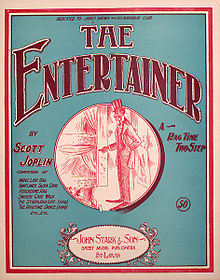The Entertainer (rag)
| The Entertainer | |||||
|---|---|---|---|---|---|
| by Scott Joplin | |||||

First edition cover of "The Entertainer"
|
|||||
| Genre | Ragtime | ||||
| Form | Rag time two step | ||||
| Published | 1902 | ||||
| Publisher | John Stark & Son | ||||
| Duration | 3:53 | ||||
Instrument: Piano solo
|
|||||
"The Entertainer" is a 1902 classic piano rag written by Scott Joplin.
One of the classics of ragtime, it returned to international prominence as part of the ragtime revival in the 1970s, when it was used as the theme music for the 1973 Oscar-winning film The Sting. Composer and pianist Marvin Hamlisch's adaptation reached #3 on the Billboard pop chart and spent a week at #1 on the easy listening chart in 1974.The Sting was set in the 1930s, a full generation after the end of ragtime's mainstream popularity, thus giving the inaccurate impression that ragtime music was popular at that time.
The Recording Industry Association of America ranked it #10 on its "Songs of the Century" list.
"The Entertainer" is sub-titled "A Rag Time Two Step", which was a form of dance popular until about 1911, and a style which was common among rags written at the time.
Its structure is: Intro AA BB A CC Intro2 DD.
It is primarily set in the key of C major; however, for the C section (commonly referred to as the 'Trio'), it modulates to the subdominant, F major, then through a transitional passage modulates back to C major for the D section. The "B" section contains an indication that the melody is to be played an octave higher on the repeat.
In the June 7, 1903 St. Louis Globe-Democrat, contemporary composer Monroe H. Rosenfeld described "The Entertainer" as "the best and most euphonious" of Joplin's compositions to that point. "It is a jingling work of a very original character, embracing various strains of a retentive character which set the foot in spontaneous action and leave an indelible imprint on the tympanum."
...
Wikipedia

